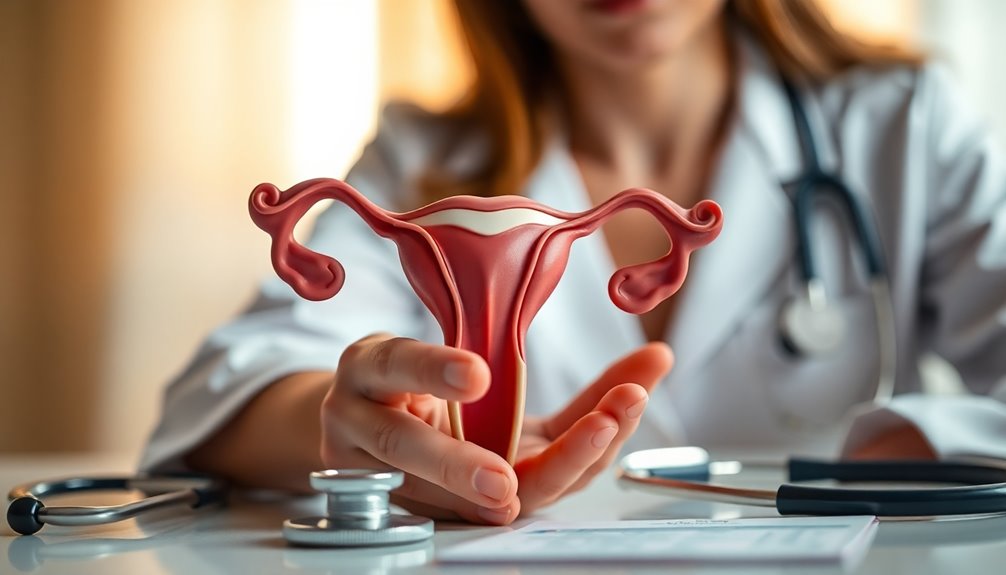If you're experiencing pain during sex, it could be due to a condition called dyspareunia. This discomfort can arise from various factors, including vaginal dryness, pelvic floor dysfunction, infections, or even endometriosis. Psychological aspects like stress or past trauma can also contribute to your pain. Symptoms often include sharp or burning sensations during penetration. It's essential to address this issue with open communication, both with your partner and a healthcare professional. By doing so, you can discover effective treatment options and support, leading to a more fulfilling sexual experience. There's much more to uncover about this topic.
Key Takeaways
- Dyspareunia can occur due to vaginal dryness, often linked to hormonal changes in postmenopausal women, affecting lubrication during intercourse.
- Anatomical changes from previous surgeries, such as hysterectomies, can create scar tissue that contributes to painful intercourse.
- Pelvic floor dysfunction, characterized by muscle tension or weakness, may lead to discomfort during sexual activity.
- Infections like yeast infections or STIs can cause sharp or burning pain during intercourse.
- Psychological factors, including anxiety and past trauma, are significant contributors to pain during sex, affecting approximately 30% of cases.
Understanding Dyspareunia

Have you ever wondered why some people experience pain during sex? This condition, known as dyspareunia, affects about 10-20% of sexually active individuals, particularly women.
Painful intercourse can occur before, during, or after sex and may feel sharp or throbbing. Common causes include vaginal dryness, hormonal changes, infections, or anatomical issues.
Psychological factors, like anxiety or past trauma, can also play a significant role. To understand what's causing your discomfort, a healthcare provider will likely take a thorough medical history and perform a physical examination.
Treatment options are tailored to your needs and may involve physical therapy, counseling, medication, or lubricants to ease the pain and improve your sexual experience.
Common Symptoms of Pain

When you experience pain during sex, you might feel various types of discomfort, from sharp pain to deep aching sensations.
It's crucial to recognize that both physical and psychological factors can contribute to these symptoms, impacting not just your body but also your relationships.
Understanding these elements can help you address the issue more effectively.
Types of Pain Experienced
Experiencing pain during intercourse can take various forms, impacting your sexual health and overall well-being. Many people report sharp or burning sensations, especially during penetration. You might also feel deep pelvic pain related to conditions like endometriosis. Muscle spasms or cramping in the pelvic area can arise from involuntary contractions of the vaginal muscles, leading to a condition known as vaginismus. Pain may also occur during tampon insertion or gynecological exams, indicating that discomfort isn't just limited to sexual activity. Dyspareunia affects 10-20% of sexually active individuals, highlighting its prevalence.
| Type of Pain | Description | Potential Causes |
|---|---|---|
| Sharp/Burning | Often felt during penetration | Vaginal dryness, infections |
| Deep Pelvic Pain | Discomfort deep within the pelvis | Endometriosis, pelvic inflammatory disease |
| Muscle Spasms/Cramping | Involuntary contractions of vaginal muscles | Vaginismus, anxiety |
Physical vs. Psychological Factors
Understanding the interplay between physical and psychological factors is vital when addressing pain during intercourse.
Physical issues like vaginal dryness, infections, or conditions such as endometriosis can directly lead to painful intercourse, affecting around 10-20% of sexually active individuals. You might experience sharp pain during penetration, deep aching during thrusting, or throbbing discomfort lasting for hours after.
On the psychological side, anxiety, stress, and a history of sexual trauma can exacerbate physical pain, creating a cycle of avoidance and increased discomfort.
Vaginismus, marked by involuntary vaginal muscle contractions, can also contribute to a burning sensation or feelings of obstruction.
A thorough evaluation of both physical and psychological aspects is vital for effectively addressing sexual dysfunction and managing pain.
#
Impact on Relationships
Pain during intercourse can greatly affect relationships, leading to a range of common symptoms that strain intimacy. When you experience painful intercourse, it often results in decreased sexual satisfaction, creating tension and emotional distance between you and your partner.
Feelings of shame or embarrassment may prevent you from discussing these issues, further hindering communication. This avoidance of sexual activity can greatly reduce physical intimacy, impacting your relationship dynamics.
Emotional distress, like anxiety or depression, can exacerbate these challenges, trapping you both in a cycle of dissatisfaction. Open communication and mutual understanding about the struggles related to painful intercourse are essential for fostering trust and intimacy, helping you navigate the complexities of your sexual health and emotional needs together.
Physical Causes of Pain

When sexual intimacy becomes uncomfortable, it's often due to several physical causes that can affect your experience. A common issue is lack of lubrication, which can stem from insufficient foreplay or hormonal changes, leading to painful intercourse during penetration.
Injuries or irritation in the vaginal area, like cuts from shaving or tears from childbirth, can also cause significant discomfort. Vaginismus, characterized by involuntary contractions of the vaginal muscles, may create a burning sensation, making penetration painful or impossible.
Additionally, vaginal atrophy, especially during menopause, results in thinning and drying of vaginal walls, contributing to discomfort. Finally, endometriosis can cause deep pain during sexual activity, often requiring medical evaluation for effective management.
Psychological Factors Involved

When you experience pain during sex, anxiety and fear can play a significant role in your discomfort.
Past trauma might also influence your feelings, creating psychological barriers that make intimacy challenging.
Understanding these emotional factors is essential for addressing and overcoming the pain you face.
Anxiety and Fear Responses
How does anxiety influence your sexual experiences? Anxiety and fear can trigger your body's fight-or-flight response, leading to muscle tension and involuntary contractions of the pelvic floor. This can result in painful intercourse, making intimacy feel intimidating.
You might find yourself caught in a cycle of anticipatory anxiety about potential pain, which only worsens your discomfort. Research shows that women with anxiety disorders often report higher instances of dyspareunia, underscoring the link between psychological health and sexual functioning.
Addressing these anxiety-related issues through therapy and counseling can be transformative. By developing effective coping strategies, you can work towards breaking this cycle, ultimately improving your sexual experiences and enhancing your overall well-being.
Past Trauma Influence
Past trauma greatly impacts sexual experiences, often leading to heightened anxiety and fear around intimacy.
For many individuals, past experiences of sexual abuse or assault can result in painful intercourse. The psychological factors stemming from trauma can manifest as vaginismus, where involuntary muscle contractions make penetration painful or even impossible.
Research shows that those with a history of trauma often experience stress and hyperarousal, which can intensify physical pain during sexual activity.
Trauma can also distort your perceptions of intimacy and safety, making it challenging to engage in sexual activities without discomfort or distress.
Seeking therapy or counseling can help you address these psychological impacts, allowing you to process your experiences and improve your sexual health.
Risk Factors to Consider

Several risk factors can contribute to painful intercourse, making it essential to understand their impact.
Hormonal changes, like those during menopause, often lead to vaginal dryness, affecting about 50% of postmenopausal women.
Chronic conditions, such as endometriosis or pelvic inflammatory disease, impact an estimated 10% of women and can markedly increase dyspareunia.
Psychological factors, including a history of sexual trauma, anxiety, and depression, are linked to nearly 30% of painful intercourse cases.
Additionally, relationship issues or poor communication between partners can worsen discomfort, as emotional distress often correlates with physical pain.
Finally, prior surgeries, such as hysterectomies, may result in anatomical changes or scar tissue, heightening the risk of painful intercourse for many individuals.
Diagnosis and Medical Evaluation

What steps should you take if you're experiencing painful intercourse?
Start by scheduling an appointment with your healthcare provider for a thorough diagnosis.
They'll likely begin with a detailed medical history and physical examination to identify the causes of painful intercourse, also known as dyspareunia.
Expect pelvic exams, and your doctor may collect vaginal fluid and urine samples to test for infections.
Imaging studies, like transvaginal ultrasounds, may be conducted to check for structural issues.
If these initial tests don't yield answers, laparoscopy could be an option.
Don't overlook the importance of discussing any psychological factors with your provider, as mental health can influence your symptoms.
Open communication is key to ensuring an effective evaluation and appropriate care plan.
Treatment Options Available

When it comes to treating painful intercourse, identifying the underlying causes is essential for effective management.
Your treatment options may include hormonal therapies, like topical estrogen for vaginal dryness or medications such as Ospemifene for menopausal-related pain.
You might also benefit from physical therapy that focuses on strengthening and relaxing your pelvic floor muscles, which can help alleviate tension and discomfort.
Over-the-counter lubricants, especially water- or silicone-based products, can enhance comfort during sex by addressing dryness.
In more severe cases, surgical interventions may be necessary to correct anatomical issues or remove conditions like endometriosis that contribute to pain.
Consulting with a healthcare provider will help you determine the best approach for your situation.
## Impact on Relationships

When you experience pain during sex, it can strain your emotional connection with your partner.
Open communication becomes essential as it helps both of you understand the situation and navigate the feelings that arise.
Without this dialogue, the intimacy you once shared may suffer, leading to frustration and emotional distance.
Communication With Partner
How can open communication transform your sexual relationship? When you discuss sexual discomfort openly, you foster understanding and empathy with your partner.
This transparency reduces feelings of isolation and shame often tied to painful intercourse. By sharing your experiences, you can identify solutions together, like trying different positions or using lubricants to ease discomfort.
Effective communication not only strengthens intimacy and trust but also promotes a healthier sexual relationship. It encourages both of you to seek professional help when needed, leading to proper diagnosis and treatment, particularly if there are underlying issues such as emotional dysregulation.
Regularly addressing sexual health normalizes the conversation, making it easier to tackle issues as they arise. Ultimately, this openness enhances overall relationship satisfaction and emotional connection.
Emotional Connection Challenges
Although emotional challenges like anxiety and fear of pain can create significant barriers, they often lead to avoidance of sexual intimacy, which strains relationships.
This withdrawal can affect your emotional health and spark relationship conflicts.
To improve connection and sexual satisfaction, consider focusing on:
- Open communication about fears and feelings
- Addressing stigma surrounding sexual health issues
- Seeking counseling to navigate emotional factors
When you and your partner discuss these challenges honestly, it fosters intimacy and understanding.
Ignoring emotional hurdles only deepens feelings of shame and isolation.
By tackling these issues together, you can enhance both your sexual experiences and your overall relationship dynamics. Additionally, developing secure attachment bonds can help alleviate anxiety and strengthen your connection, leading to more fulfilling intimacy.
Importance of Open Communication

Open communication is essential for addressing the discomfort that can arise during sex, as it allows partners to share their feelings and concerns without fear of judgment. Discussing painful intercourse openly can help you both explore solutions, like trying different positions or using lubrication. Research shows that 75% of women experience this pain at some point, so normalizing these conversations can reduce stigma and feelings of isolation. Engaging in dialogue about sexual health enhances emotional intimacy, fostering a more supportive connection. Remember, healthcare providers encourage you to communicate your concerns, promoting a collaborative approach to managing any issues. Additionally, understanding the potential for emotional manipulation in relationships can help partners navigate any underlying issues that may contribute to discomfort.
| Benefits of Open Communication | Actions to Contemplate |
|---|---|
| Reduces feelings of isolation | Try different positions |
| Enhances emotional intimacy | Use lubrication |
| Fosters collaboration with healthcare providers | Discuss openly with your partner |
When to Seek Medical Help

Discussing discomfort during sex is an essential step, but it's just as important to recognize when professional help is necessary.
If you experience painful intercourse and notice any of the following, it's time to seek medical help:
- Persistent pain during sex lasting more than a few weeks
- Additional symptoms like bleeding, unusual discharge, or severe discomfort with tampons
- Emotional distress or anxiety affecting your relationships
Consulting a healthcare provider is important, especially if you have a history of pelvic surgeries, chronic illnesses, or hormonal changes.
Addressing these issues early can improve your quality of life and intimacy.
Don't hesitate to reach out for support; your health and well-being are worth it.
Frequently Asked Questions
How Do I Stop Getting Hurt During Sex?
To stop getting hurt during sex, focus on enhancing your comfort.
Start by incorporating longer foreplay to boost natural lubrication or try using lubricants to minimize friction.
Experiment with different positions to find what feels best for you.
Engage in pelvic floor exercises to strengthen your muscles and reduce tension.
Don't hesitate to communicate openly with your partner about your feelings and seek guidance from a healthcare provider for any underlying concerns.
Why Does It Hurt Me so Much During Sex?
When you experience pain during sex, it can stem from several factors. Insufficient lubrication might lead to friction, making penetration uncomfortable.
Medical issues, like endometriosis or pelvic inflammatory disease, can cause deep discomfort.
Psychological factors, such as anxiety or past trauma, may cause muscle tension, adding to the pain.
Additionally, conditions like vaginismus can lead to involuntary contractions, making penetration feel obstructed and painful.
Understanding these factors might help you seek appropriate solutions.
Is Pain After Sex Good or Bad?
Pain after sex isn't good; it usually signals something's wrong.
While occasional mild soreness can be normal, persistent pain can indicate underlying issues that need attention.
It can also affect your emotional well-being and intimacy, making you anxious about future encounters.
If you experience consistent pain, it's essential to consult with a healthcare professional.
They can help identify the cause and improve your overall experience and quality of life.
Is It Normal to Have Pain During Sex?
Isn't it strange how something meant to be pleasurable can sometimes cause discomfort?
It's not uncommon to experience pain during sex; many people do at some point. While occasional discomfort can be normal, persistent pain isn't something to ignore.
Factors like lack of lubrication, hormonal changes, or even emotional stress can play a role.
Communicating with your partner and seeking medical advice can help address these concerns and improve your experience.
Conclusion
To summarize, experiencing pain during sex can feel like a shadow looming over intimacy. It's crucial to understand that you're not alone and that various factors, both physical and psychological, can contribute to this discomfort. By addressing these issues and seeking the right treatment, you can pave the way for a more enjoyable experience. Open communication with your partner and healthcare provider can help dispel the darkness, allowing the light of intimacy to shine through.










